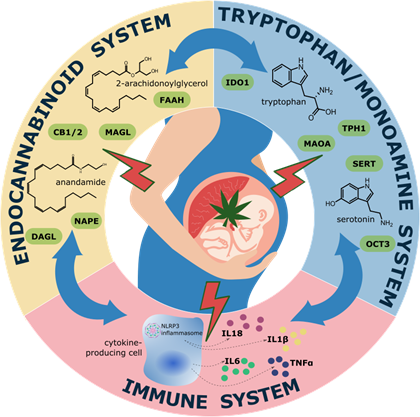 The consumption of cannabis during pregnancy has increased by more than 170% between 2009 and 2016. Recent large-scale epidemiological studies have shown that prenatal use of exocannabinoids may result in various complications for both the mother and her fetus, such as fetal growth restrictions, increased admissions to the neonatal intensive care unit, miscarriage, or preterm birth. Nonetheless, the causal mechanism(s) of prenatal cannabis-related toxicity remain largely unexplained. The placenta is known to play a key role in maintaining the homeostasis in the fetoplacental unit of various hormones, neurotransmitters, and mediators, thus providing optimal in utero conditions for the developing fetus. Here we hypothesize that prenatal cannabis can disrupt placental endocrine and/or immune functions. Based on systematic literature research and our pilot experiments, we plan to focus on three mutually interconnected placental systems that might be affected by prenatal use of cannabis: the endocannabinoid system, the tryptophan and monoamine system, and the immune system. The project aims to clarify the mechanisms linking prenatal cannabis exposure to poor placental functions. Using a wide range of experimental approaches, we will study the effects of exocannabinoids on placental endocannabinoid system, tryptophan and monoamine homeostasis, and immune response.
The consumption of cannabis during pregnancy has increased by more than 170% between 2009 and 2016. Recent large-scale epidemiological studies have shown that prenatal use of exocannabinoids may result in various complications for both the mother and her fetus, such as fetal growth restrictions, increased admissions to the neonatal intensive care unit, miscarriage, or preterm birth. Nonetheless, the causal mechanism(s) of prenatal cannabis-related toxicity remain largely unexplained. The placenta is known to play a key role in maintaining the homeostasis in the fetoplacental unit of various hormones, neurotransmitters, and mediators, thus providing optimal in utero conditions for the developing fetus. Here we hypothesize that prenatal cannabis can disrupt placental endocrine and/or immune functions. Based on systematic literature research and our pilot experiments, we plan to focus on three mutually interconnected placental systems that might be affected by prenatal use of cannabis: the endocannabinoid system, the tryptophan and monoamine system, and the immune system. The project aims to clarify the mechanisms linking prenatal cannabis exposure to poor placental functions. Using a wide range of experimental approaches, we will study the effects of exocannabinoids on placental endocannabinoid system, tryptophan and monoamine homeostasis, and immune response.
This project recently recieved funding from the Grant Agency of the Czech Republic (grant no. 23-07094S).